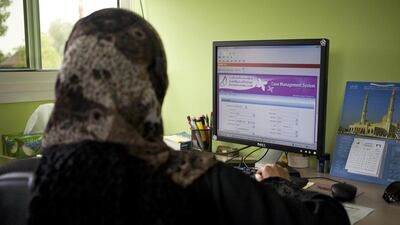DUBAI // In the week that the Dubai Foundation for Women and Children revealed it has received 31 cases of child abuse this year, a helpline operator has given an insight into what her job entails.
Ateyat Hussein is senior customer service representative at the foundation, and a regular worker on the 24-hour helpline.
“Once a helpline agent receives a call, the first screening is done to know whether the victim is in a safe place or not,” Ms Hussein said.
“Then we obtain the caller’s complete details, the problems the caller is facing, and then log it into the system.”
She said the system was designed so that helpline workers could immediately start logging the details of the case.
Ms Hussein said she was honoured to work for the shelter, and did it “to serve its cause and to serve a humanitarian cause”.
The helpline agents work in shifts from 8am to 3pm, 3pm to 10pm and 10pm to 8am.
There are three female employees, all of whom speak English, Arabic, and Urdu.
The foundation is looking to increase the number of helpers and Ms Hussein said she could envisage a time when men would also work there.
“It depends on the qualifications of the applicants to this job, so you may see within our future expansion plans some male employees working our helpline.”
But there was one proviso.
“A knowledge of a variety of languages is a necessity to reach as many nationalities as possible, especially in the UAE where there is such a mixture,” Ms Hussein said.
Employees must also go through a series of tests to ensure they have the mental stability to listen to callers tell of what can sometimes be traumatic situations.
“Once a week the staff are provided with self-care, where we are exposed to techniques and strategies to cope with our stress levels at our personal and work levels,” she said.
“This helps us to enhance our lives in different ways and makes a big difference in boosting our self-esteem and helping us excel.”
The therapy is vital in ensuring that the helpline operators can handle a variety of situations, said Ms Hussein.
“It’s necessary to provide the helpline agent with skills and techniques to tackle their emotional health and reduce stress in a working environment.”
On average, the helpline receives about 30 calls a day.
While some are from people in dire need of assistance, most of them are just general inquiries about what the foundation can provide for women and children.
Ms Hussein said the training ensured the operators could manage to be impartial and self-controlled while handling the calls.
“Of course, the helpline agent does feel sympathy and must show empathy while listening to the caller. This makes me able to realise lots of things in life that were not clear to me earlier,” she said.
She explained that the most important aspect of her job was making sure that all of her callers’ problems were kept confidential.
Ms Hussein said that while her job was demanding, “a simple thank you that comes at the end of the call gives me such a sense of pride”.
aalkhoori@thenational.ae

